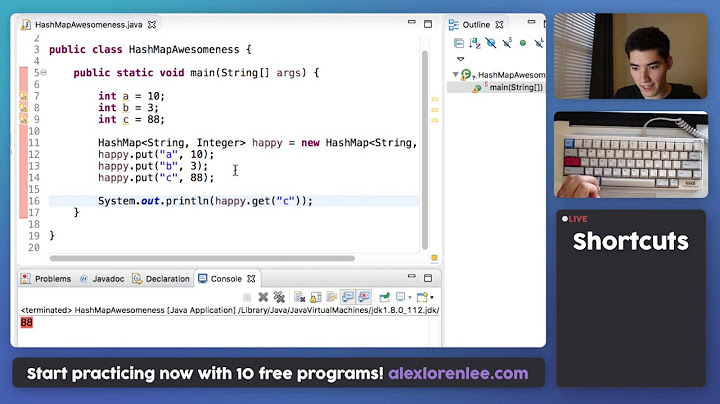How to populate java.util.HashMap on the fly from Scala code?
Solution 1
There are a bunch of different ways to accomplish this, only some of which have appeared in the answers thus far.
Method One: Since java.util.HashMap has the constructor HashMap(Map<? extends K,? extends V> m), you could pass it a valid Java Map. And you can do this trivially with Scala's helpful JavaConversions:
scala> import scala.collection.JavaConversions._
import scala.collection.JavaConversions._
scala> val myMap = Map(1->"Hi",2->"Bye")
myMap: scala.collection.immutable.Map[Int,java.lang.String] = Map((1,Hi), (2,Bye))
scala> val jmap = new java.util.HashMap[Int,String](myMap) // Need explicit types
jmap: java.util.HashMap[Int,String] = {1=Hi, 2=Bye}
The downsides here are that you have to already have a Scala map (slightly wasteful if you're just going to create a Java one, perhaps), and that you have to specify the types. But it's compact and painless.
Method Two: Alternatively, you can create a new code block as the declaration statement, so you don't even need to have JavaConversions available:
scala> val jmap2 = {
| val x = new java.util.HashMap[Int,String]
| for ((k,v) <- List(1->"Howdy",2->"partner")) x.put(k,v)
| x
| }
jmap2: java.util.HashMap[Int,String] = {1=Howdy, 2=partner}
Slightly less compact, but completely general, and as efficient (or inefficient) as you care to make it.
Method Three: Also, you can create an anonymous subclass of HashMap as long as it's okay to have a subclass (i.e. .getClass won't return java.util.HashMap), and use the initializer to set your values:
scala> val jmap3 = new java.util.HashMap[Int,String] {
| put(1,"Yo"); put(2,"bro")
| }
jmap3: java.util.HashMap[Int,String] = {1=Yo, 2=bro}
scala> jmap3.getClass.getName
res0: java.lang.String = $anon$1
scala> jmap3.getClass.getSuperclass.getName
res1: java.lang.String = java.util.HashMap
The downside is, of course, that it's a subclass of HashMap rather than HashMap, but it's more compact than the assignment-from-code-block version since you don't need to assign the new map to a val.
Method Four: And finally, of course, you can create a method that does what you want and call it instead:
scala> def newJHM[A,B](kv: Iterable[(A,B)]) = {
| val jhm = new java.util.HashMap[A,B]
| kv.foreach(i => jhm.put(i._1,i._2))
| jhm
| }
newJHM: [A,B](kv: Iterable[(A, B)])java.util.HashMap[A,B]
scala> val jmap4 = newJHM(Seq(1->"Bye",2->"Now")) // Type inference now works
jmap4: java.util.HashMap[Int,java.lang.String] = {1=Bye, 2=Now}
This is barely less compact than the others and gets the types correct without you having to specify them, so it can be an appealing choice if you're doing this more than once.
P.S. Just for fun, I've shown a variety of ways of getting some key-value pairs into the map, but they're not specific to a given method (except for #1 which requires a map). Mix and match at your preference.
Solution 2
You could do the map as an anonymous class, and do the initialization as part of the instance initialization of the object.
import java.util.HashMap
val jhm = new HashMap[String, Int](){
put(key1, value1)
put(key2, value2)
}
This actually works equally well in Java (except for requiring double-braces {{}}), but is much more idiomatic in Scala.
Solution 3
Building on Randall's answer, you can use JavaConversions to help a bit.
import collection.JavaConversions.asMap
import java.util.HashMap
val jhm = new HashMap[Int,String](Map(1->"one", 2->"two"))
Solution 4
All the methods and constructors of java.util.HashMap are available to you, of course, but that does not provide a way to initialize a map unless you have another one to supply the initial values. The closest you're probably going to get is:
import java.util.HashMap
val jhm = new HashMap[String, Int]
«code to add key-value pairs to jhm»
Related videos on Youtube
Nermin Serifovic
Updated on May 04, 2022Comments
-
Nermin Serifovic about 2 years
I am unit testing java code from ScalaTest and would like to populate a java.util.HashMap within the same statement it gets declared. Is it possible to do this in Scala?
-
Ruediger Keller over 13 yearsI don't think there is something like static initialization of an object. I guess you are referring to an instance initializer, aren't you?
-
Daniel Spiewak over 13 yearsTechnically, Scala doesn't have instance initializers. The code that you show is executing the
putmethods inside the constructor for the anonymous inner class.








